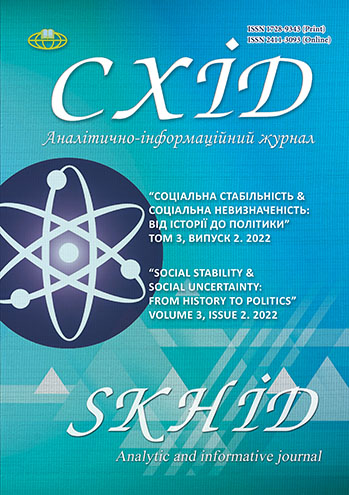Global institutional transformations and modern educational and scientific strategies for the paradigm of sustainable development of society
DOI:
https://doi.org/10.21847/1728-9343.2022.3(2).263729Keywords:
sustainable development of society, institutional transformations, philosophy of education, international strategy, higher education, global systemAbstract
The article considers the processes of democratization of social institutions of education and science on the basis of the world-system global-stadial concept developed by the author and presented in his earlier works as an institutionalized process of functioning of deliberative socioeconomic development in the institutional model of globalization. The author considers “The 2030 Agenda for Sustainable Development” (UN) and the Global Action Program “Education for Sustainable Development” (UNESCO) as key documents shaping the tasks of further development of these social institutions. It highlights the key educational concepts for the transformation of the global world and shows how they correspond to the goals and objectives of these key international documents; substantiates specific directions for key areas of the educational goal of global sustainable development (for all levels of education), which should be included in the education and training system, formulates the tasks of further transformation of educational institutions; states that the principles of education defined in these global programs are most successfully implemented today within the framework of the “Education for Sustainable Development” model, which allows the formation of such key competencies as a sustainable lifestyle, knowledge of human rights and mechanisms for their observance, gender equality, promoting a culture of peace and non-violence and recognizing cultural diversity.
Downloads
References
Bericht Bildung auf einen Blick 2017 - OECD-Indikatoren.
Bildung auf einen Blick 2017: Attraktivitat der Hochschulausbildung weiter ungebrochen: Der neue OECD-Bericht «Bildung auf einen Blick 2017: OECD-Indikatoren»// Weiterbildung/Bildungspolitik.Veroffentlicht: Dienstag, 12. September 2017: https://www.bildungsspiegel.de/news/weiterbildung-bildungspolitik/1767-bildung-auf-einen-blick-2017-attraktivitaet -der-hochschulausbildung-weiter-ungebrochen.
Chase-Dunn, С.К.(2015). Global Formation. Structures of the World-Economy. Cambridge, Blackwell Publishers.
Human Development Report (2016). New York, Oxford, Oxford University Press.
Leading Education 2030. The 2030 Agenda for Sustainable Development: http://en.unesco.org/education2030-sdg4.
Learning Framework 2030 – OECD. http://www.oecd.org/education/2030/learning-framework-2030.htm.
Marcuse, H. (1993). Kritik der reinen Toleranz. Frankfurt.a.Mayne, Suhrkamp Verlag (In German).
Metzger, J.-L. (2017). Entre utopie et resignation: la reforme permanente d’un service public. Рaris, L’Harmattan (In French).
Newby, H. (1999). Higher education in the twenty-first century - some possible futures. Perspectives: Policy and Practice in Higher Education, 3 (4): 106-113. https://doi.org/10.1080/13603109981676
Petrow, N. (2013). Internationalisierung der Hochschulausbildung in Deutschland. Sozial Extra 37 (5): 10–12 (In German).
Rat der Europäischen Union: Eine nachhaltige Zukunft für Europa: Reaktion der EU auf die Agenda 2030 für nachhaltige Entwicklung – Schlussfolgerungen des Rates. http://data.consilium.europa.eu/doc/document/ST-10370-2017-INIT/de/pdf.
Sintschenko, V. (2017). Globale Transformationen der Gegenwart.(Band 1. Systemischen globale Transformation). Saarbrücken: Palmarium Academic Publishing. (In German)
The Future of Education and Skills Education 2030 – OECD. https://www.researchgate.net/figure/The-Future-of-Education-and-Skills-OECD-Education-2030-Framework-Knowledge-skills_fig7_326032010.
Vereinte Nationen: Resolution der Generalversammlung – Transformation unserer Welt: die Agenda 2030 für nachhaltige Entwicklung: http://www.un.org/Depts/german/gv-70/band1/ar70001.pdf.
Ziel 4. Hochwertige Bildung: https://clck.ru/wqYE8
Zinchenko, V. (2017). Institutional trends globalization and transformation of socio-economic development. Mokslas ir praktika: aktualijos ir perspektyvos. Mokslinių straipsnių rinkinys. Kaunas: LSU, 257-265.
Zinchenko, V. (2018). Humanistic Values and Enlightenment Strategies of Global Society in the Potential of r Sustainable Development of Democracy. American Research Journal of Humanities and Social Sciences, 4 (1): 1-13. https://www.arjonline.org/papers/arjhss/v4-i1/16.pdf
Zinchenko, V. (2014). Hlobalizatsiya i hlobalistyka. Lviv, «Novyy Svit-2000». (In Ukrainian)
Zinchenko, V.V., Alkema, V.H., Burova, O.B., Sotnichenko, O.A., Pyetukhova, O.M., Shtanko L.O (2018).Mizhnarodna ta zovnishnoekonomichna diyalnist. Lviv, Mahnoliya 2006. (In Ukrainian)
Zinchenko, V. (2016). Internatsionalizatsiya ta modernizatsiya systemy i menedzhmentu vyshchoyi osvity: nimetska osvitnio-naukova model (S.6-30). In: Analiz providnoho vitchyznyanoho ta zarubizhnoho dosvidu internatsionalizatsiyi vyshchoyi osvity na osnovi kulʹturno-humanitarnykh stratehiy (Part II). Kyiv, IVO NAPN Ukrayiny.
Zinchenko, V.V. (2020). Alterhlobalizm yak transformatsiyna model stiykoho rozvytku, internatsionalizatsiyi ta efektyvnoyi transformatsiyi system suspilʹstva i osvity. In: Analiz providnoho vitchyznyanoho ta zarubizhnoho dosvidu shchodo stratehiy vyshchoyi osvity v umovakh internatsionalizatsiyi dlya stiykoho rozvytku suspilʹstva (P.60-64) Kyiv, Institute of Higher Education of the National Academy of Sciences of Ukraine https://lib.iitta.gov.ua/725133/1/Analiz_strategiy_VO_v_umovah_internac_ch1-2_analit_IVO-2020-270p_avtors-kolektiv.pdf (In Ukrainian).
Downloads
Published
How to Cite
Issue
Section
License
Copyright (c) 2022 Viktor Zinchenko

This work is licensed under a Creative Commons Attribution-NonCommercial-NoDerivatives 4.0 International License.
1. Authors bear responsibility for the accuracy of facts, quotations, numbers and names used.
2. Manuscripts are not sent back.
3. The publisher does not always agree with the authors' opinion.
4. The authors reserve the right to authorship of the work and pass the first publication right of this work to the journal under the terms of a Creative Commons Attribution-NonCommercial-NoDerivatives 4.0 International License. This license allows others to distribute (copy) the published work for non-commercial purposes, provided there is mandatory attribution to its authors and a link to the first publication in our journal.
5. The authors have the right to conclude separate supplement agreements that relate to non-exclusive work distribution in the form in which it has been published by the journal (for example, to upload the work to the online storage of the journal or publish it as part of a monograph), provided that the reference to the first publication of the work in this journal is included.

